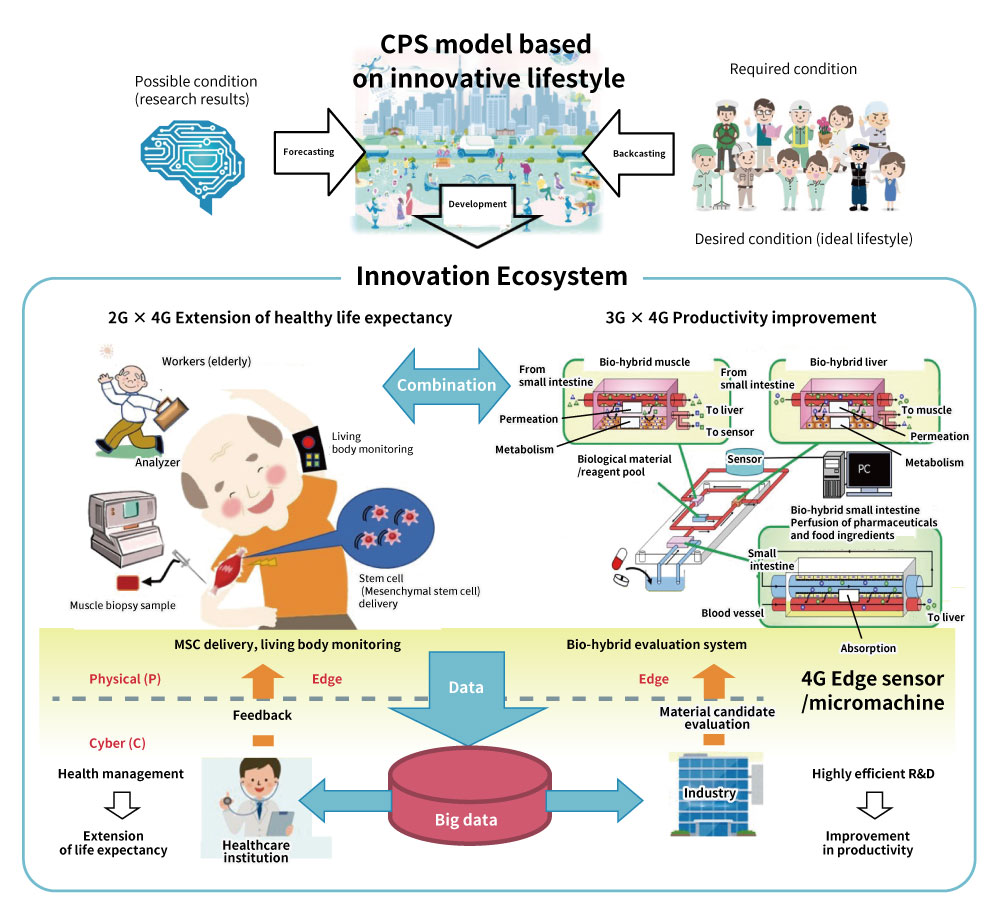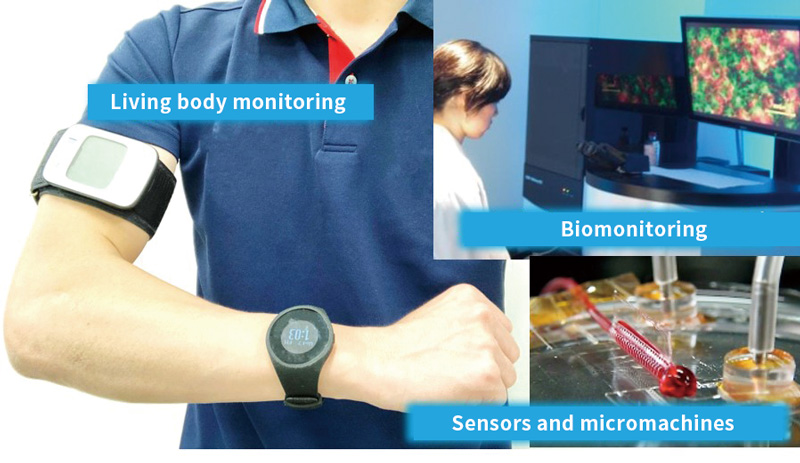Research AreaⅢ Overcoming the decline in the working-age populationInnovative Cyber Physical System Model bridged by Sensors and Micromachines in the field of Medicine and Healthcare
Helping to solve problems related to the decline in the working-age population Proposing a CPS model that helps improve healthcare and people’s health
Leaders
-
Project leaderSatoshi KonishiProfessor, Department of Mechanical Engineering, College of Science and EngineeringProfile
-
Group leaderAkio TokudaProfessor, Department of Business Administration, College of Business AdministrationProfile
-
Group leaderSatoshi FujitaProfessor, Department of Sport and Health Science, College of Sport and Health ScienceProfile
-
Group leaderTakuya FujitaProfessor, Department of Pharmacy, College of Pharmaceutical SciencesProfile
Pursuing research to achieve the double goals of extending workers’ healthy life expectancy and improving productivity in drug discovery and functional food development
Japan's working-age population, which has been steadily declining since it reached its peak in 1995, is expected to drop even further to below 70 million by 2030. This phenomenon greatly affects the country’s industrial and economic development, among other things. Against this background, this research project aims to develop and propose solutions to this problem by helping improve the quality of work and productivity with the use of an innovative Cyber Physical System (CPS), which is particularly needed in medicine and healthcare.
CPS is a mechanism that closely links the cyber and physical (real) worlds to create new value for the present time, where all kinds of products can be connected to the Internet through IoT. Ritsumeikan University has R&D capabilities that are among the world’s best with regard to sensors and micromachines, which are used on the edge of CPS near the physical world, that is, as cyber-physical interfaces. The project, drawing on this strength, has two goals: extending workers’ healthy life expectancy and improving productivity in drug discovery and functional food development. We are working toward these goals by constructing a CPS model that contributes to medicine and healthcare, hence people’s health, by linking the health conditions of living organisms (physical) with computers/the Internet (cyber) for the former, and cultured biological models (physical) with computers/ the Internet (cyber) for the latter.

Research results expected in this project
Creating new products and services with sensor/micromachine technologies
Working toward application in society using management techniques
This project is characterized by its range of objectives that is not limited to the creation of advanced products and services through integrated research covering both humanities and scientific disciplines but extends to application in society using management techniques. This original research is pursued by four groups working in organic collaboration: one group specializing in management, two groups focusing on the extension of workers’ healthy life expectancy and on improvement in productivity in drug discovery and functional food development, respectively, and one group in charge of research and development concerning sensors and micromachines as key technologies.
The Tokuda Group, headed by Prof. Tokuda, who specializes in business administration, comprises experts in MOT, psychology, and law. This group is conducting research to define the CPS design that can create value in various settings and ways in society, and as services and products to construct a “Social Value System Design Model” as a new CPS model. To do so, the group relies on knowledge from various fields, including psychology, with its concept of the Trajectory Equifinality Model (TEM) and the product semantics. The other three groups pursue research while keeping in mind this innovative CPS model as the ultimate goal so as to develop products and services that are highly applicable in society. The Tokuda Group is also working on the development of international standards for performance evaluation for CPS applied to medicine and healthcare. It is often the case that the standards independently created in different industrial fields by trade organizations in Japan are not compatible with more universal Western standards. To ensure the global dissemination and applicability of products and services to be produced in this project, the group intends to develop performance evaluation standards for CPS in the fields of medicine and healthcare, as global criteria originating from Japanese academia ahead of the rest of the world.
The Satoshi Fujita Group is engaged in research related to extending the healthy life expectancy of the working population. The first goal of this group is to develop a new wearable device that uses sensors and micromachine technologies to be developed by the Konishi Group to collect the wearer's biochemical data, such as physical activity level and proteins contained in saliva, sweat, and blood, to measure the wearer's physical activity level and nutritional condition. The new device will then be used to create a customized health monitoring and feedback system. This system, with the individual health data it collects and analyzes, would make it possible to provide individualized programs for physical activity and nutrition intervention, remote training, and the like. The group's second research goal is to develop means of activating workers' bodies to improve the quality of their work. The focus is on mesenchymal stem cells. Based on Prof. Satoshi Fujita's previous research in which he found that administration of mesenchymal stem cells accelerates intracellular signals that lead to skeletal muscle hypertrophy, the group will investigate whether or not recovery from exercise-induced muscle damage can be accelerated by mesenchymal stem cells through thermal stimulation.
The Takuya Fujita Group is in charge of R&D aimed at improving productivity in drug discovery and functional food development. In other words, the researchers want to be able to determine the pharmacological potential of candidate pharmaceuticals and health foods early in the pipeline to accelerate their development. One approach to this goal is developing a biofunctional chip called “Organ-on-a-chip (OoC)” based on iPS cell technology. An OoC can culture cells and simulate the activities and mechanics of an organ or tissue in a microenvironment and, when connected with multiple micro-organs, can even enable real-time observation of interactions and responses between organs. The group has already constructed microphysiological systems (MPS) such as artificial intestinal tubes and artificial blood vessels using micro-actuators in collaboration with the Konishi Group. Using these devices, the group intends to develop for practical application screening system devices that evaluate the gastrointestinal absorbability and other properties of drug candidate compounds in the process of new pharmaceutical development. As another approach to the research goal, the group will also attempt to develop a smart screening technology that automatically monitors the functional responsiveness of the liver, muscles, and so on upon the consumption of functional foods and the effects of muscle cell responses to electrical stimulation on the liver.
The Konishi Group is in charge of developing sensor/micromachine technologies satisfying requirements by taking account of the direction proposed by the Tokuda Group that are socially acceptable, responsive to consumer needs, and practically applicable, thereby providing technological support to the research of the two Fujita Groups. Sensors and micromachines are edge devices at the interface of living bodies playing the role of bridges in CPS. The group will develop edge devices necessary for lifestyle habit monitoring in a remote physical exercise instruction system, to be used in the Satoshi Fujita Group’s research. By using bio-monitoring (sensing) technologies, the group will also develop a wearable micromachine that can acquire biological information anywhere and anytime. Moreover, the group will construct, in collaboration with the Takuya Fujita Group, a bio-hybrid edge device system that analyzes the dynamics of pharmaceuticals and functional foods in the digestive and vascular systems, by using OoC technology that allows the construction of biological reaction systems and cultured cell tissues on micromachine chips.
Going beyond DX and proposing solutions to humanity’s common problems in the cyber-real fused space to contribute to global harmony
In our current living-with-coronavirus era, we are required to go beyond digital transformation (DX) and create new value in line with society’s irreversible move toward a situation wherein cyber and real spaces are completely synchronized, on condition that such a situation is not harmful to human life, as suggested by the Ministry of Internal Affairs and Communications of Japan. We hope that our CPS construction project will constitute part of the response to this changing world, proposing solutions to humanity’s common problems related to major demographic changes.
-

Medical and health monitoring with sensors and micromachines as connectors
077-561-3488 (9:00-17:30 on weekdays)
072-665-2570 (9:00-17:30 on weekdays)
075-465-8224 (9:00-17:30 on weekdays)
